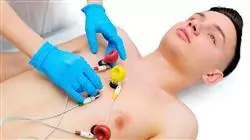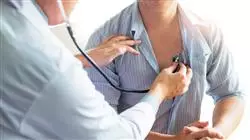University certificate
The world's largest faculty of medicine”
Description
Delve into the importance of the relationship between atrial fibrillation and heart failure, from its epidemiology to its prognostic implication"

This TECH postgraduate certificate aims to enable medical specialists to combine their professional and academic careers, so that they can keep abreast of advances in the field of Arrhythmias and Heart Failure . The program, prepared by cardiology specialists with extensive experience in the field, stands out for its innovative content that includes not only a review of the most important aspects of cardiac rhythm disorders, but also includes a study of physiological stimulation therapies.
During the course of this program, the graduate will learn more about the relationship between atrial fibrillation and heart failure, from its epidemiology to its prognostic implication, and the importance of the choice of antiarrhythmic drugs and especially ablation. The program will also provide an update on the assessment of ventricular arrhythmias, with special emphasis on the role of genetics and nuclear magnetic resonance.
With this and all the information you will find in this educational program, the specialist will be able to define a new line of action, based on techniques that will increase their chances of success in the treatment of Arrhythmias and Heart Failure . All this will allow you to update and expand your knowledge with the help of the best specialists, which will provide you with a different and possibly more effective vision of the subject.
A specific, complete, rigorous and quality online program with which you will be able to organize your own schedule. In addition, you will have the support of the teaching staff, who will be available to resolve any doubts and discuss the different issues that arise during the academic process.
Make a difference with current and innovative knowledge. Stand out in the cardiology sector with this postgraduate certificate"
This postgraduate certificate in Arrhythmias and Heart Failure contains the most complete and up-to-date scientific program on the market Its most notable features are:
- The development of practical cases presented by experts in Cardiology
- The graphic, schematic, and practical contents with which they are created, provide scientific and practical information on the disciplines that are essential for professional practice
- Practical exercises where self-assessment can be used to improve learning
- Its special emphasis on innovative methodologies
- Theoretical lessons, questions to the expert, debate forums on controversial topics, and individual reflection assignments
- Content that is accessible from any fixed or portable device with an Internet connection
Study this program from home, from the office or from wherever you want and whenever you want. Remember that TECH provides the content, but you set the time"
The program includes, in its teaching staff, professionals from the sector who bring to this education the experience of their work, in addition to recognized specialists from prestigious reference societies and universities.
Its multimedia content, developed with the latest educational technology, will allow the professional a situated and contextual learning. In other words, a simulated environment that will provide immersive education programmed to prepare for real situations.
This program is designed around Problem-Based Learning, whereby the professional must try to solve the different professional practice situations that arise during the academic year. For this purpose, the student will be assisted by an innovative interactive video system created by renowned and experienced experts.
Review, in 6 weeks, the importance of rhythm disorders in heart failure and update your personal vade mecum"

Learn more about the concept of Tachycardiomyopathy and learn about its diagnosis and pharmacological and electrophysiological treatment"
Objectives
Arrhythmias and Heart Failure are on cardiologists' agendas on a daily basis. The frequency with which these disorders appear, and the evolution of their treatment, obliges specialists to be constantly learning and updating their knowledge. Given that sometimes the professional's working life makes it difficult to fulfill this task, TECH main objective is to offer the opportunity to study a program that meets the requirements of the specialty, with the convenience of being able to do so from anywhere and adapted to the needs of the student.

Visualize your goals and trust TECH methodology. You will be able to exceed your own expectations thanks to the reference content you will find in this program"
General Objectives
- Update general knowledge as well as the most innovative aspects of cardiological processes involving cardiac rhythm disorders
- Delve into the clinical management and indications of the different procedures performed for the diagnosis and treatment of these cardiac conditions
- Delve into the diagnosis and treatment of arrhythmias based on clinical and electrocardiographic aspects, as well as invasive techniques and electrophysiological studies
- Broaden knowledge in the operation, monitoring and implantation technique of the main implantable devices used for the treatment of arrhythmias
- Delve deeper into the problems in cardiac rhythm disorder that can arise across the spectrum of patients
- Achieve a mastery of the rhythm disorder problems present in the various scenarios faced by the cardiologists in their routine clinical practice
Specific Objectives
- Review the importance of rhythm disorders in heart failure
- Know in depth the importance of the AF-Heart Failure relationship, from its epidemiology to its prognostic implication
- Review the role of antiarrhythmic drugs, especially ablation, in the management of AF in patients with heart failure
- Update in the assessment of ventricular arrhythmias in heart failure, delving into the role of genetics and MRI
- Review the current indications for CRS therapy and other devices in HF
- Learn about the novel aspects of physiological stimulation therapies
- Review the concept of Tachycardiomyopathy with a broad approach, including its epidemiology, diagnosis and treatment, both pharmacological and electrophysiological

This TECH postgraduate certificate will not only allow you to update your knowledge, but you will be able to expand your knowledge in less time than you expect"
Postgraduate Certificate in Arrhythmias and Heart Failure.
Cardiac arrhythmias are disturbances in the rhythm of the heart, that is, in the way the heart beats. The heart beats in regular, predictable cycles to pump blood through the body and provide oxygen and nutrients to the tissues. In a healthy person, the heart's electrical impulses originate in the sinus node, which is the heart's natural pacemaker, and propagate through a specific electrical system that produces the heartbeat.
In contrast, in a person with arrhythmias, the heart rhythm becomes irregular, too fast or too slow. Arrhythmias can be caused by a number of factors, such as heart disease, electrolyte imbalances, structural problems, congenital defects, or changes in the electrical activity of the heart.
Heart failure, on the other hand, occurs when the heart cannot pump enough blood to meet the body's needs. Heart failure occurs in about 50% of patients who have heart disease. The causes of heart failure can also be diverse, such as valvular disease, heart muscle disease, high blood pressure, among others.
Treatment for cardiac arrhythmias and heart failure may include lifestyle changes such as diet, exercise, habit modification such as quitting smoking or moderating alcohol consumption, and medications that control heart rhythm and improve the heart's pumping ability. In some cases, implantable devices such as pacemakers, implantable cardioverter-defibrillators or cardiac resynchronization devices may also be required.
It is important to remember that the management of cardiac arrhythmias and heart failure should be performed by an interdisciplinary team, led by a cardiology specialist, who will work to determine the appropriate type of treatment for each patient's individual needs.







